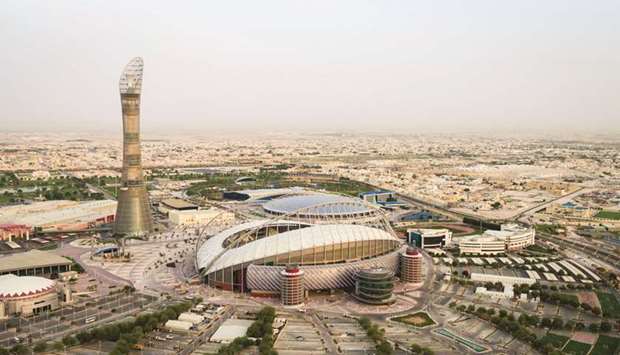Khalifa International Stadium Following an extensive redevelopment, the stadium was inaugurated in May 2017 ahead of the Amir Cup final. In 2019, the stadium hosted the IAAF World Athletics Championship and matches during the Arabian Gulf Cup and FIFA Club World Cup.
Key facts
40,000 capacity
First tournament-ready venue for Qatar 2022
Illustrious hosting history, including Asian Games, Arabian Gulf Cup and AFC Asian Cup
Located in Aspire Zone, 13km from Doha city centre
Proposed to host matches up to and including the quarter-finals stage during Qatar 2022
Achieved four-star design and build rating from Global Sustainability Assessment System (GSAS)
Legacy post 2022: Qatar’s national stadium
Lusail Stadium
The superstructure’s concrete and steel works have been completed, along with the stadium’s external primary steel works. Significant progress has been made in relation to the mechanical, electrical and plumbing works inside the structure. Stadium set to be completed in 2021.
Key facts:
80,000 capacity
Located in Lusail City, 16km from Doha city centre
Qatar’s biggest tournament venue proposed to host the final, along with matches during every stage of Qatar 2022
Design inspired by fanar lantern and intricate detailed bowls
Concept designed by Foster + Partners
Situated in the heart of Qatar’s futuristic Lusail City, which will become home to 250,000 people
Legacy post-2022: school, office and community space
Al Janoub Stadium
The stadium was inaugurated in May 2019 when it became the first Qatar 2022 tournament venue to be built from scratch.
Key facts
40,000 capacity
Located in Al Wakrah, 23km from Doha city centre
Designed by legendary Iraqi-born British architect Dame Zaha Hadid
Design is inspired by the sails of traditional dhow boats, in tribute to Al Wakrah’s seafaring past
Four-star design and build rating from GSAS
Proposed to host matches up to and including the quarter-finals stage during Qatar 2022
Hosted FIFA World Cup qualifiers and matches during the Arabian Gulf Cup in 2019
Legacy post 2022: home of Al Wakrah Sports Club
Al Janoub Stadium precinct will contain a public park, along with a range of other amenities for the local community, including a hospital and various sporting facilities
Al Janoub Park opened in February 2020
Education City Stadium
Construction work was completed in December 2019. The stadium is set to open this year.
Key facts:
40,000 capacity
Stadium is nicknamed the ‘Diamond in the Desert’
Located in Education City, home of Qatar Foundation (QF), 12km from Doha city centre
Proposed to host matches up to and including the quarter-finals stage during Qatar 2022
First Qatar 2022 tournament venue to achieve five-star design and build rating from GSAS
Designed by FIA Fenwick Iribarren Architects
Legacy post 2022: home of Qatar’s women’s national team and two schools. The stadium will also provide sporting facilities for the QF community
Al Bayt Stadium
Construction work has been completed at the stadium, which will open this year. Al Bayt Park,
situated in the stadium precinct, has opened.
Key facts:
60,000 capacity
Located in Al Khor, 43km from Doha city centre
Proposed to host matches up to and including the semi-finals stage during Qatar 2022
Designed by Dar Al-Handasah
Design resembles a traditional Arab tent known as ‘bayt al sha’ar’
28,000 seats from the stadium will be donated to developing countries after the tournament
Al Bayt Stadium precinct will contain 400,000m² of green spaces for the local community
The public park, known as Al Bayt Park, opened in February 2020
Legacy post-2022: boutique hotel and sporting venue
Al Rayyan Stadium
The concrete frame and roof installation have been completed. Work on the upper-tier stands is approaching completion. More than half of the façade columns have been installed. The stadium is set to open this year.
Key facts:
40,000 capacity
Located in Al Rayyan, 22km from Doha city centre
Proposed to host matches up to and including the quarter-finals stage during Qatar 2022
Designed by Ramboll
Design inspired by Islamic architecture and Qatar’s rolling sand dunes
Legacy post-2022: home of Al Rayyan Sports Club
85% of the old Al Rayyan Stadium has been reused in the new development
Al Thumama Stadium
The stadium’s concrete frame and roof columns have been installed. Work on the upper-tier stands is approaching completion. Construction is due to be completed by the end of 2020.
Key facts:
40,000 capacity
Located in Al Thumama, 13km from Doha city centre
Proposed to host matches up to and including the quarter-finals stage during Qatar 2022
Designed by Qatari Architect Ibrahim M. Jaidah
Design inspired by the ‘gahfiya’, a traditional woven cap worn by men across the Arab world
Design won MIPIM/The Architectural Review Future Project Award in May 2018
Features 50,000m² of green spaces
Legacy post-2022: A branch of the specialised orthopaedic and sports medicine hospital, Aspetar, and a boutique hotel
Ras Abu Aboud Stadium
475 containers have been delivered to the site, while 90 have been installed so far. Steel fabrication for the structure is 50% complete. The fabrication of the bleachers, concourse slabs and roof steel are progressing. Construction work set to be completed in 2020.
Key facts:
40,000 capacity
Located in Ras Abu Aboud, 10km from Doha city centre
Stadium will be the first fully demountable tournament venue in FIFA World Cup history
Structure will be built using modified shipping containers
The stadium will be completely demounted after the tournament, with its parts used to create a number of sporting facilities across Qatar
Designed by Fenwick Iribarren Architects

..
